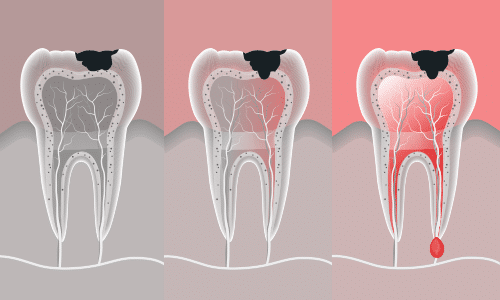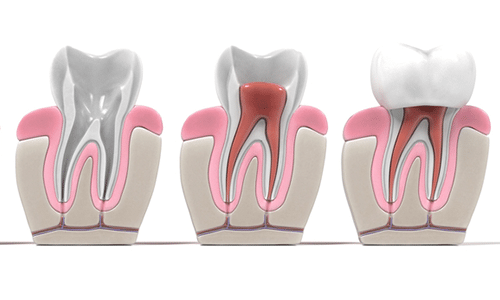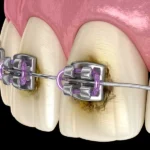Root Canal Cost in Houston

Table of Contents
Average Root Canal Cost in Houston
The average root canal cost in Houston is around $1,000. Expect a front tooth root canal to cost less than the cost of a posterior tooth root canal, depending on the specifics of the case. For example, if there is calcification, you can expect to pay more or if the tooth is vital or there is an abscess. The out-of-pocket expenses will also vary based on the type of insurance carried as well as some other insurance-related factors. Talk with your insurance provider to know for sure.
How to Save Money on a Root Canal
If you do not have insurance, consider joining a dental discount plan to save on treatment costs. These programs are not insurance but instead contract with a network of dentists willing to offer reduced costs to members.
Patients who have health insurance attached to a high deductible plan have the option to contribute to a Health Savings Account (HSA). The purpose of an HSA is to pay for out-of-pocket health, dental, vision, and other costs on a tax-free basis. You can access your HSA to pay some or all of your portion of expenses for the root canal procedure.
Typical Cost of Root Canal
When determining the cost of a root canal treatment, the total will depend on the number of roots in the tooth. A front tooth will only have one canal, while the larger teeth located towards the back of the mouth known as “molars” may have multiple canals making it more complex and less accessible. Therefore, the cost is relative to the number of canals in the tooth.
A root canal performed on a bicuspid or molar in the mid-region of the mouth can range in cost from $400 to $1000. The most typical cost for this type of treatment is about $900-$1200. That said root canal treatment for one of the back molars will typically cost in the range of $700-$1400. The average cost will range around $600-$1400 in total. It must be mentioned again that each case is unique and different and that is why it is essential to talk with your dental care provider to ensure an accurate estimate of this type of dental work.
How Much Does a Root Canal Cost without Insurance?
The cost of a root canal depends on which tooth requires treatment. If you do not have dental insurance, you can expect your cost to fall within one of the ranges below.
- Bicuspid tooth located in the middle of the mouth: $800 to $1,200
- Front tooth: $700 to $1,100
- Molar: $1,200 to $1,800

Does Insurance Cover Cost of Root Canal?
Dental insurances typically cover 100% of your routine costs, it only covers about half of a major procedure such as a root canal. This entirely depends on which type of policy you have. On average, you can expect your dental insurance to cover anywhere from 50% – 80% of the total cost of a root canal procedure. These estimates vary from patient to patient, and most dental plans will have a maximum ceiling that determines how much will be covered. For example, patients may be covered up to $2,000 per year for this type of dental work and will have to pay out of pocket to cover the rest.
Many companies also have what’s called a “waiting period” on your insurance, meaning you have to carry the policy for a minimum amount of time before you’re eligible to receive compensation for more extensive procedures such as a root canal. Waiting too long for full coverage could wreak havoc on your mouth, so it’s best to not put it off if possible.
How Much Does a Root Canal Cost with Insurance?
The cost of a root canal with insurance varies depending on the specifics of your coverage. Most dental insurance plans have a deductible, which is a flat amount that patients need to pay before the insurance provider covers any of the claims. You could also have a co-pay, defined as the percentage of the bill you are responsible to pay after the insurance company has applied your deductible. You can expect to pay anything between the range of figures listed below.
- Bicuspid: $500 to $1,200
- Front tooth: $400 to $1,100
- Molar: $600 to $1,500
Are There Any Additional Costs Involved In Root Canal Therapy?
There may be some additional costs associated with this type of dental treatment. For example, if an emergency root canal treatment is needed, there may be other expenses involved. If root canal treatment is needed on an emergency basis, it could easily add $100 or more to the cost of the treatment. Sometimes this type of treatment is required on the weekends or holidays. Fortunately, many dental care providers will accommodate patients who experience some traumatic injury during these times.
Also, once a root canal treatment has been completed, the tooth will require some restorative work such as a dental crown. The cost of restoration is not included in the basic cost of root canal treatment. The expense associated with a dental crown can range in price from $500-$1400 or more depending on the type of restoration performed. Patients have a choice between porcelain crowns or crowns made of other types of material such as gold. The type of material used and the complexity of the restoration will have a direct impact on the overall price. Some more advanced types of restorations may cost anywhere from $600-$1400 or more.
Root Canal Cost Factors
As you can see from the range of prices already listed, several factors determine how much you pay for a root canal. The location of the tooth matters since molars are the most challenging types of teeth to treat. Front teeth are the easiest to get at and therefore the least expensive to treat. Other factors that impact the cost of your oral surgery treatment include:
- Whether you have the treatment performed by a dentist or endodontist: Some general dentists have the skills and training to perform a root canal. However, all endodontists have completed two to three years of additional training focusing specifically on issues of the tooth pulp and oral surgeries. We employ dentists with advanced credentials at Omega Dental Specialists, so you can expect to see an endodontist.
- The complexity of the root canal: Sometimes a general dentist will attempt to perform a root canal only to have to refer the patient to an endodontist to complete the procedure. The more complicated your oral health issue and the more time it takes to treat, the higher the cost will be.
- Region of the country: Patients who live in large metropolitan areas typically pay more for dental work than those who live in a suburban or rural area.
- Cost of additional services: Your provider may bill the cost of a dental crown, X-rays, or other additional services you require separate from the root canal procedure.

What is a root canal treatment?
When you receive a root canal, your endodontist removes infected pulp from the inside of the tooth. The purpose is to prevent the spread of further infection and save your natural tooth. After cleaning and disinfecting the inside and outside of the tooth, your endodontist applies filling material and covers it with a dental crown. The crown prevents the tooth from further infection.
Reasons You May Need a Root Canal
Here are the common reasons dentists refer patients to an endodontist for a root canal:
- Tooth has sustained trauma or injury
- Decay has penetrated too deep within the tooth
- A filling covers most of the tooth surface
- Cracks or chips in a tooth
- Infection in the gums
- Persistent tooth sensitivity
Although you may not look forward to undergoing a root canal, it is essential to follow through with the procedure if your dentist has recommended it. Infection from the pulp of your tooth could spread to other parts of your body if left untreated, causing serious health complications. At the same time, Omega Dental understands that patients sometimes have concerns about cost. This guide will let you know what you can expect to pay for a root canal in 2021 with or without insurance.
Root canal treatment involves a wide variety of different types of procedures. They are all designed to achieve the same results and that it is to deal with infected or damaged pulp within a tooth. When the soft inner core of the tooth also known as the pulp becomes damaged or diseased, root canal therapy is the best treatment for this type of condition. In fact, it is widely considered to be far more effective regarding cost and dental health longevity as compared to tooth extraction.
The inner core of the tooth or the pulp runs through the center of the tooth from near the top all the way down into the root. The pulp is important for some reasons including the fact that it provides nerves to the tooth and delivers nutrients as necessary. When the pulp is injured, damaged, or diseased the tissue eventually dies. When this happens, and no treatment is administered, the surrounding tissue eventually becomes infected and serious complications can develop such as the formation of an abscess. Endodontic treatment is a smart and sensible way of dealing with a wide variety of conditions as discussed here.
Root Canal FAQs
Q: What is the out-of-pocket cost of a root canal?
A: General dentists charge between $1,200 and $1,800 for a molar and $700 to $1,200 for all other teeth. You can expect to pay up to 50 percent more when an endodontist performs the procedure. Keep in mind that endodontists are much more experienced at performing root canals than general dentists. According to the American Association of Endodontics, endodontists average 25 root canals per week while the typical dentist performs only two.
Q: Is it cheaper to get a root canal or extraction?
A: Having a tooth extracted costs less than a root canal. Should you later need an implant to fill the gap left by the extraction or other treatments, the extraction will end up costing more.
Q: What happens if I can’t afford a root canal?
A: An infected tooth left untreated can cause bacteria to travel to your jaw, bloodstream, brain, or throughout your entire body. While the cost of a root canal might seem expensive now, the service you will require to treat the infection will cost much more later. We recommend joining a dental savings plan if you do not have insurance. You can also look into low-cost or free financing options such as CareCredit. Omega Dental Specialists works exclusively with Wells Fargo Health Advantage to provide affordable savings options for our patients.
Q: Do root canals hurt?
A: You receive anesthesia before your endodontist does any work on your mouth to block any sensations of pain. Most patients state that getting a root canal is no more uncomfortable than any other procedure like a dental crown or filling. Soreness and numbness after the anesthesia wear off is normal, and it can last up to a few days. Your endodontist will discuss pain management with you before the end of your appointment.





